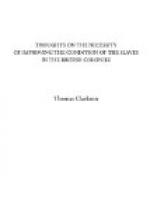religion. The people of England have no desire
to interfere with your property, but with your
oppression. It is probable that your property
would be improved by the change. But, to examine
this right more minutely, I contend, first, that they
have always a right to interfere in behalf of humanity
and justice wherever their appeals can be heard.
I contend, secondly, that they have a more immediate
right to interfere in the present case, because the
oppressed persons in question, living in the British
dominions and under the British Government, are their
fellow subjects. I contend again, that they
have this right upon the ground that they are giving
you, the West Indians, a monopoly for their
sugar, by buying it from you exclusively at a much
dearer rate than they can get it from other
quarters. Surely they have a right to say
to you, as customers for your produce, Change your
system and we will continue to deal with you; but if
you will not change it, we will buy our sugar elsewhere,
or we will not buy sugar at all. The East Indian
market is open to us, and we prefer sugar that is
not stained with blood. Nay, we will petition
Parliament to take off the surplus duty with which
East Indian sugar is loaded on your account.
What superior claims have you either upon Parliament
or upon us, that you should have the preference?
As to the East Indians, they are as much the subjects
of the British empire as yourselves. As to the
East India Company, they support all their establishments,
both civil and military, at their own expense.
They come to our Treasury for nothing; while you,
with naval stations, and an extraordinary military
force kept up for no other purpose than to keep in
awe an injured population, and with heavy bounties
on the exportation of your sugar, put us to such an
expense as makes us doubt whether your trade is worth
having on its present terms. They, the East India
Company, again, have been a blessing to the Natives
with whom they have been concerned. They distribute
an equal system of law and justice to all without respect
of persons. They dispell the clouds of ignorance,
superstition, and idolatry, and carry with them civilization
and liberty wherever they go. You, on the other
hand, have no code of justice but for yourselves.
You deny it to those who cannot help themselves.
You hinder liberty by your cruel restrictions
on manumission; and dreading the inlet of light, you
study to perpetuate ignorance and barbarism.
Which then of the two competitors has the claim to
preference by an English Parliament and an English
people? It may probably soon become a question
with the latter, whether they will consent to pay
a million annually more for West India sugar than
for other of like quality, or, which is the same thing,
whether they will allow themselves to be taxed annually
to the amount of a million sterling to support West
Indian slavery.




